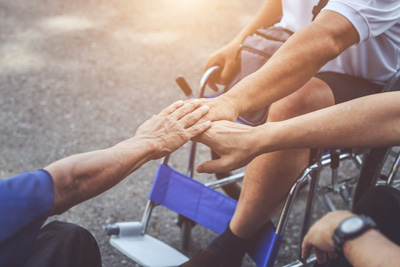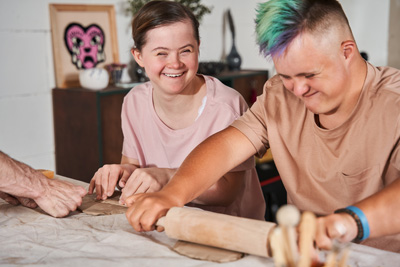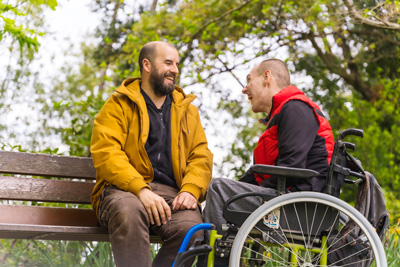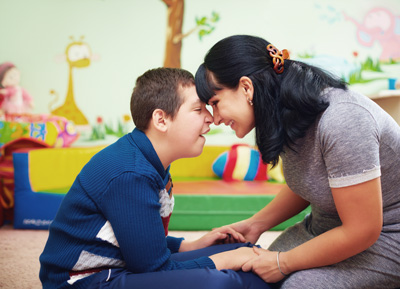“Positive reinforcement teaches us that everyone has the potential to learn and grow.” – B.F. Skinner
Waivers
 Cumberland River Homes provides services through Kentucky’s SCL and Michelle P waiver programs.
Cumberland River Homes provides services through Kentucky’s SCL and Michelle P waiver programs.
Day Programming
 Day programming is provided in community/nonresidential settings and enables the supported individual to reach and maintain maximum functioning and community integration. Day Programming Services help individuals develop meaningful daily routines, which may include work-like settings.
Day programming is provided in community/nonresidential settings and enables the supported individual to reach and maintain maximum functioning and community integration. Day Programming Services help individuals develop meaningful daily routines, which may include work-like settings.
Activities are age and culturally appropriate, meeting the level of cognitive/behavior function and incorporate special interests of the individual. Activities include daily living skills training, self-advocacy education, adaptive and social skills training, sensory or motor development, and reduction or elimination of maladaptive behavior.
Supports may include teaching concepts and skills to promote independence including following instructions, attendance/punctuality, task completion, budgeting/money management, problem solving, health and safety.
SCL Personal Assistance
 Personal assistance is provided by a direct support professional and enables an individual to accomplish tasks that the individual normally would do for themselves if not for the disability. The service is available only to an individual who lives in their own residence or that of their family.
Personal assistance is provided by a direct support professional and enables an individual to accomplish tasks that the individual normally would do for themselves if not for the disability. The service is available only to an individual who lives in their own residence or that of their family.
Personal assistance shall include hands-on assistance (performing a task for an individual) reminding, observing, guiding, or training an individual in activities of daily living, reminding, observing, guiding, or training a participant in independent activities of daily living, assisting an individual in managing the individual’s medical care including making medical appointments and accompanying the individual to medical appointments.
SCL Residential Services
 Staffed residences include up to twenty-four hour supervision to individuals in need of residential services. Staff provides daily living skills assistance/training including ambulation, dressing, grooming, eating, toileting, bathing, meal planning, and preparation, laundry, budgeting and financial matters, home care and cleaning, grocery shopping, leisure skill instruction or self- medication instruction, social skills training, and working on reducing challenging behavior if behavior supports is included in the person’s plan of care.
Staffed residences include up to twenty-four hour supervision to individuals in need of residential services. Staff provides daily living skills assistance/training including ambulation, dressing, grooming, eating, toileting, bathing, meal planning, and preparation, laundry, budgeting and financial matters, home care and cleaning, grocery shopping, leisure skill instruction or self- medication instruction, social skills training, and working on reducing challenging behavior if behavior supports is included in the person’s plan of care.
The staff provides support and training to obtain the outcomes of the individual as identified in the person-centered plan and provide or arrange transportation to services, activities, and medical appointments as needed.
Respite
 Respite is a program of supervision and care provided to an individual who is an SCL/MP participant that gives caregivers and the individual temporary relief. This support will be provided only to an individual who does not receive residential services.
Respite is a program of supervision and care provided to an individual who is an SCL/MP participant that gives caregivers and the individual temporary relief. This support will be provided only to an individual who does not receive residential services.
SCL/MPW Case Management
 Case Management services will include assessment, reassessment, appropriate evaluations, intake, referral, and eligibility processes as well as the ongoing monitoring of service delivery. Case managers who work with the individuals will utilize the person-centered planning process in the identification and implementation of support strategies, and shall ensure the strategies incorporate the following principles: empowerment, community inclusion, health and safety assurance, and the use of formal, natural, and community supports.
Case Management services will include assessment, reassessment, appropriate evaluations, intake, referral, and eligibility processes as well as the ongoing monitoring of service delivery. Case managers who work with the individuals will utilize the person-centered planning process in the identification and implementation of support strategies, and shall ensure the strategies incorporate the following principles: empowerment, community inclusion, health and safety assurance, and the use of formal, natural, and community supports.
The case manager role is essential to the person-centered process and the coordination and monitoring of the services provided to the individual. The case manager shall assist an individual in gaining access to and maintaining employment, membership in community clubs, groups, activities, and opportunities at the times and frequencies the participant chooses.
MPW Community Living Supports (CLS)
 CLS services are provided to Michelle P. individuals residing in his/her own or in his/her family’s home to facilitate independence and promote integration into the community. CLS services include assistance, prompting, observing, or training in activities of daily living (ADL).
CLS services are provided to Michelle P. individuals residing in his/her own or in his/her family’s home to facilitate independence and promote integration into the community. CLS services include assistance, prompting, observing, or training in activities of daily living (ADL).
ADL activities may include laundry, routine household care and maintenance, bathing, eating, dressing, personal hygiene, shopping, use of money, medication management, socialization, relationship building, leisure choices, participation in generic community activities, and therapeutic outcomes. It may also include monitoring medication and nonmedical care not requiring a nurse or physician intervention. Services may also include accompanying and assisting an individual while utilizing transportation.
MPW Personal Care
 Personal care services are provided by direct care staff to a Michelle P. waiver recipient who does not need highly skilled or technical care. Service shall be age appropriate and consist of assisting a recipient with eating, bathing, dressing, personal hygiene, or other activities of daily living.
Personal care services are provided by direct care staff to a Michelle P. waiver recipient who does not need highly skilled or technical care. Service shall be age appropriate and consist of assisting a recipient with eating, bathing, dressing, personal hygiene, or other activities of daily living.
MPW Homemaker Services
 Homemaker services are provided by direct care staff to a Michelle P. waiver recipients who are functionally unable, but would normally perform age-appropriate homemaker tasks and for whom the caregiver regularly responsible for homemaker activities is temporarily absent or unable to manage the homemaking activities. Services consist of general household activities.
Homemaker services are provided by direct care staff to a Michelle P. waiver recipients who are functionally unable, but would normally perform age-appropriate homemaker tasks and for whom the caregiver regularly responsible for homemaker activities is temporarily absent or unable to manage the homemaking activities. Services consist of general household activities.
SCL Community Access Services
 Community Access Services are implemented to increase the participant’s ability to develop natural supports and access community resources including educational, recreational, religious, civic, or volunteer opportunities with an outcome of less reliance on formal supports and greater reliance on natural or unpaid supports as established in the participant's person-centered service plan.
Community Access Services are implemented to increase the participant’s ability to develop natural supports and access community resources including educational, recreational, religious, civic, or volunteer opportunities with an outcome of less reliance on formal supports and greater reliance on natural or unpaid supports as established in the participant's person-centered service plan.
Community Access Services have an emphasis on the development of personal social networks, membership opportunities, friendships, and relationships for the participant as established in the participant's person-centered service plan. Community Access Services will be provided outside the participant's home or residential setting and occur during the day, in the evening, or on weekends.
SCL Supported Employment Services
 Supported Employment Services enable a participant to engage in paid work that occurs in an integrated community setting with competitive wages and benefits commensurate to the job responsibilities. Supported Employment Services are covered for a participant if no change in the impact of a participant's disability on the participant's employment has occurred. A Supported Employment Long-Term Support Plan is completed and incorporated into the participant's person-centered service plan.
Supported Employment Services enable a participant to engage in paid work that occurs in an integrated community setting with competitive wages and benefits commensurate to the job responsibilities. Supported Employment Services are covered for a participant if no change in the impact of a participant's disability on the participant's employment has occurred. A Supported Employment Long-Term Support Plan is completed and incorporated into the participant's person-centered service plan.
Supported Employment Services can be participant-directed, provided in a variety of settings are provided by a trained Supported Employment Specialist. Supported employment will include a person-centered job selection discovery process that will be a respectful way to get to know a participant who is seeking a job and break past conceived notions about what a participant can or cannot do and include developing a Person-Centered Employment Plan based upon the participant's life experiences, interests, talents, contributions, impact of disability, vulnerabilities, and support needs.
Long-term support and follow-up will be provided to help a participant maintain the job and experience continued success after the Participant is fully integrated into the workplace and supported employment specialist is no longer needed on a regular basis. The supported employment specialist shall continue to be available for the participant if and when needed for support or assistance with any job change or job advancement.
SCL/MPW Positive Behavior Supports Services
 Positive Behavior Supports (PBS) is a person-centered behavior management approach rooted in evidence-based principles that aims to enhance the quality of life for individuals facing behavioral or developmental challenges. It focuses on understanding and addressing the underlying causes of difficult behavior by identifying the reasons a behavior occurs and instead teaches and promotes the acquisition of new adaptive skills.
Positive Behavior Supports (PBS) is a person-centered behavior management approach rooted in evidence-based principles that aims to enhance the quality of life for individuals facing behavioral or developmental challenges. It focuses on understanding and addressing the underlying causes of difficult behavior by identifying the reasons a behavior occurs and instead teaches and promotes the acquisition of new adaptive skills.
As new skills and appropriate behaviors are learned, undesirable behaviors and actions are naturally reduced. By recognizing and building upon an individual’s strengths, preferences, and environmental factors, positive behavior support services empowers individuals, caregivers, and support networks to collaboratively work towards achieving positive outcomes and enriching lives within various settings. Settings include, but are not limited to, homes, schools, adult day training facilities, and the surrounding communities.
Positive Behavior Supports at Cumberland River Homes encompasses a holistic framework that not only addresses challenging behaviors but first and foremost emphasizes proactive, preventative strategies, environmental modifications, and skill building to enhance overall quality of life. Positive Behavior Supports at Cumberland River Homes uses evidence-based practices to create individualized intervention plans that are data driven, structured, and goal oriented. The holistic approach of PBS at Cumberland River Homes exists to empower individuals to achieve greater independence and reach their full potential.
